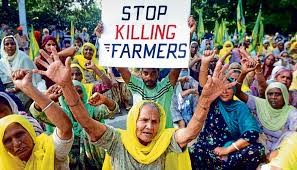The protest leads by the farmers from the state of Punjab spread like a wildfire across the country. Farmers from across country are gathered at the borders of India’s capital to protest the three laws. There are about 300 thousand tractors and 12 million farmers protesting and will take part in the tractor rally held by the farmers Union on India’s Republic Day January 26, 2021. It will be the longest march in the history of the planet earth by the farmers for roll back of three laws imposed on them by the present Government of India.
In September 2020 the Indian Government Passed 3 Bills:
- The Farmers’ Produce Trade and Commerce (Promotion and Facilitation) Act, 2020.
Expands the scope of trade areas of farmers’ produce from select areas to “any place of production, collection, aggregation”. Allows electronic trading and e-commerce of scheduled farmers’ produce.
prohibits state governments from levying any market fee or levy on farmers, traders, and electronic trading platforms for the trade of farmers’ produce conducted in an ‘outside trade area’….
- Farmers (Empowerment and Protection) Agreement on Price Assurance and Farm Services Act, 2020.
Provides a legal framework for farmers to enter into pre-arranged contracts with buyers including mention of pricing. Defines a dispute resolution mechanism.
- Essential Commodities (Amendment) Act, 2020.
Removes foodstuff such as cereals, pulses, potato, onions, edible oilseeds, and oils, from the list of essential commodities, removing stockholding limits on such items except under “extraordinary circumstances requires that imposition of any stock limit on agricultural produce be based on price rise.
Background on Farming:
Some of you may know that India is the largest producer of milk, pulses and jute, and ranks as the second largest producer of rice, wheat, sugarcane, groundnut, vegetables, fruit and cotton. It is also one of the leading producers of spices, fish, poultry, livestock and plantation crops.
Why Did The Government of India Approve The Bills?
On September 20, 2020, Prime Minister Narendra Modi referred to the bills as a watershed moment in the history of Indian agriculture and stated the bills will “ensure a complete transformation of the agriculture sector” and empower tens of millions of farmers. “Farm bills and labor bills are very important steps in the right direction. They have the potential to have more labor market flexibility, providing greater social security to workers and more formalization of the labor market. In the case of agriculture, having a much more integrated market, creating competition, having farmers getting a greater share of the price that finally the retail price that’s paid. So that helps with rural incomes.” Several educational institutes signed an open letter, expressing their support
for the three farm laws. The open letter states that the three acts “wouldn’t do away with the MSP, but rather free the farm trade from all illicit market restrictions, open the market beyond ‘mandis’ and further assists the small and marginal farmers to sell their produce at market and competitive prices. The new laws also provide full autonomy for farmers to sell their produce.” Also, they “strongly believe in the government’s assurance to the farmers to protect the farmers’ livelihoods.” The government also says that deregulation will help farmers get more value for their produce by cutting middlemen, while experts say private investment could boost India’s agriculture sector.

Why Farmers Are Opposing the Bills And Protesting:
All 3 bills aim to deregulate the agriculture market mechanism, which is tightly controlled by traders and producers. The new bills will make far easier for corporates, traders and customers to directly procure produce from farmers. Since the farmers and others have called the bills “corporate-friendly and anti-farmer.” The bills have faced strong protests mainly from Punjab farmers and alleging that it will hurt the farmers’ earnings. The government, however, maintains that they will make it effortless for farmers to sell their produce directly to big buyers. One of the main causes of the opposition is the uncertainty surrounding how the reforms “will play out in reality.” Controversy surrounding minimum support prices (MSPs), the effect on middlemen, loss of states’ revenue and low bargaining power of the farmers are some of the fears that have led to the opposition to the bills. Soon after the bills were introduced farmers across the country but mainly from Punjab and Haryana started the movement.
This movement called DELHI CHALO (means let’s go to Delhi) is started by the farmers Union mainly from Punjab, and later on other states joined the movement by taking part in the protest on the borders of India’s capital.
Why We Need To Support The Farmers Protest:
The laws directly impact the farmers in India, but they could also have a significant impact to consumers globally, who rely on India for many key items such as turmeric, chili and ginger. More than half of India’s population comes from an agricultural background. If the farmers bill gets imposed by the Indian government it will not only finish the Agriculture industry, but it will also slowly finish the farming in India.
Since CUPW is always at the forefront of raising issues from around the globe and many postal workers have their roots attached to their motherland India, I encourage you all to stand in Solidarity with the farmers of India.

In Solidarity,
Anju Parmar, 3rd Vice President
